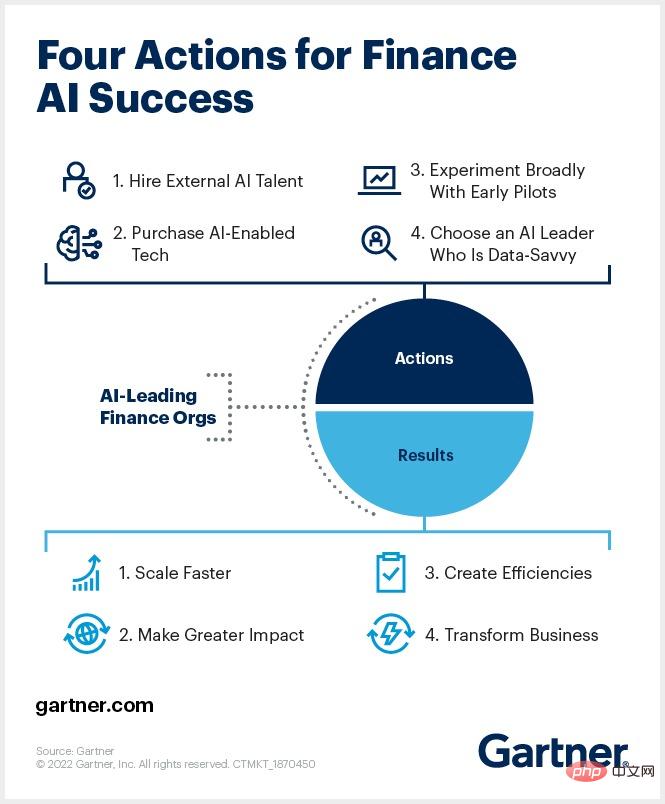 Technology peripherals
Technology peripherals
 AI
AI
 Gartner: Four steps to ensure financial AI applications are implemented correctly
Gartner: Four steps to ensure financial AI applications are implemented correctly
Gartner: Four steps to ensure financial AI applications are implemented correctly

- Artificial intelligence (AI) is increasingly important to finance, but CFOs are still learning when and how to successfully deploy them.
- Investing in artificial intelligence and other digital initiatives can blunt the negative effects of economic stress in the short term and build competitive advantage in the long term.
- In finance, successful AI implementation requires the right leadership, talent, software investment and experimentation.
The use of artificial intelligence remains an emerging priority for CFOs as they move their finance functions further into a digital future. Of those using AI, 75% said they started using it within the past two years.
"The use of artificial intelligence in finance is still in its infancy, and most early adopters have little awareness of the expected returns on such projects," said Alexander Bant, research director at Gartner. “Defining financial use cases is key – for digital initiatives in general and AI projects in particular. Ultimately, the goal is to improve your competitive position and prepare for an autonomous future, especially in today’s economy.”
Gartner research shows that leading AI deployers engage in four common behaviors that enable them to quickly meet or exceed the expected impact of their AI projects and deliver key financial and business results.
“On average, finance departments that took these four actions found twice as many AI use cases as departments that didn’t take these actions,” Bant said. "This translates into more important business results, such as new product lines, and financial department results, such as greater accuracy and shorter process times."

四Key actions to ensure the success of financial artificial intelligence:
1. Hire external AI professionals
There are three options to ensure talent with AI skills and expertise: hire new talent, upgrade existing talent skills or borrow talent from the IT department. Organizations that focus their talent strategies on recruiting external employees with AI skills are more likely to become leading AI finance organizations.
AI specific talent brings valuable experience in handling the nuances of AI. This enables organizations to overcome inertia in using AI
applications and shorten the technology learning curve. While upskilling finance staff may be less expensive, doing so may slow progress and introduce a greater potential for error. New AI professionals change traditional processes and ways of thinking by bringing new ideas to support AI deployments.
2. Invest in software with embedded AI capabilities for quick success
Buy software with embedded AI capabilities to experiment with AI and apply it to financing use cases to quickly build solutions for unique business problems of pilot. Building in-house AI solutions for all financial processes creates more work and less bandwidth to explore new pilots or use cases.
3. Experiment early and widely
Top financial AI organizations take a “quick trial and error” experimental approach to AI deployment rather than making a few big bets. Early leaders will use AI more and deploy it faster.
The three most common AI use cases are accounting processes, back-office processing, and cash flow forecasting. Customer payment forecasting is a use case explored by half of leading organizations, but rarely among less successful organizations.
4. Choose an analytical AI implementation leader
Enterprises must choose the right people to lead AI deployments to realize benefits. This might mean the head of financial planning and analysis (FP&A) or the head of financial analytics leading the AI implementation, rather than the controller.
The FP&A and Financial Analytics leader has successfully led AI with his strong analytics and data background. They rely less on understanding traditional financial processes and more on understanding the complexities of AI in a business environment.
The above is the detailed content of Gartner: Four steps to ensure financial AI applications are implemented correctly. For more information, please follow other related articles on the PHP Chinese website!

Hot AI Tools

Undresser.AI Undress
AI-powered app for creating realistic nude photos

AI Clothes Remover
Online AI tool for removing clothes from photos.

Undress AI Tool
Undress images for free

Clothoff.io
AI clothes remover

Video Face Swap
Swap faces in any video effortlessly with our completely free AI face swap tool!

Hot Article

Hot Tools

Notepad++7.3.1
Easy-to-use and free code editor

SublimeText3 Chinese version
Chinese version, very easy to use

Zend Studio 13.0.1
Powerful PHP integrated development environment

Dreamweaver CS6
Visual web development tools

SublimeText3 Mac version
God-level code editing software (SublimeText3)

Hot Topics
 Top 10 latest releases of virtual currency trading platforms for bulk transactions
Apr 22, 2025 am 08:18 AM
Top 10 latest releases of virtual currency trading platforms for bulk transactions
Apr 22, 2025 am 08:18 AM
The following factors should be considered when choosing a bulk trading platform: 1. Liquidity: Priority is given to platforms with an average daily trading volume of more than US$5 billion. 2. Compliance: Check whether the platform holds licenses such as FinCEN in the United States, MiCA in the European Union. 3. Security: Cold wallet storage ratio and insurance mechanism are key indicators. 4. Service capability: Whether to provide exclusive account managers and customized transaction tools.
 Summary of the top ten Apple version download portals for digital currency exchange apps
Apr 22, 2025 am 09:27 AM
Summary of the top ten Apple version download portals for digital currency exchange apps
Apr 22, 2025 am 09:27 AM
Provides a variety of complex trading tools and market analysis. It covers more than 100 countries, has an average daily derivative trading volume of over US$30 billion, supports more than 300 trading pairs and 200 times leverage, has strong technical strength, a huge global user base, provides professional trading platforms, secure storage solutions and rich trading pairs.
 What are the top ten virtual currency trading apps? Recommended on the top ten digital currency exchange platforms
Apr 22, 2025 pm 01:12 PM
What are the top ten virtual currency trading apps? Recommended on the top ten digital currency exchange platforms
Apr 22, 2025 pm 01:12 PM
The top ten secure digital currency exchanges in 2025 are: 1. Binance, 2. OKX, 3. gate.io, 4. Coinbase, 5. Kraken, 6. Huobi, 7. Bitfinex, 8. KuCoin, 9. Bybit, 10. Bitstamp. These platforms adopt multi-level security measures, including separation of hot and cold wallets, multi-signature technology, and a 24/7 monitoring system to ensure the safety of user funds.
 What are the stablecoins? How to trade stablecoins?
Apr 22, 2025 am 10:12 AM
What are the stablecoins? How to trade stablecoins?
Apr 22, 2025 am 10:12 AM
Common stablecoins are: 1. Tether, issued by Tether, pegged to the US dollar, widely used but transparency has been questioned; 2. US dollar, issued by Circle and Coinbase, with high transparency and favored by institutions; 3. DAI, issued by MakerDAO, decentralized, and popular in the DeFi field; 4. Binance Dollar (BUSD), cooperated by Binance and Paxos, and performed excellent in transactions and payments; 5. TrustTo
 How many stablecoin exchanges are there now? How many types of stablecoins are there?
Apr 22, 2025 am 10:09 AM
How many stablecoin exchanges are there now? How many types of stablecoins are there?
Apr 22, 2025 am 10:09 AM
As of 2025, the number of stablecoin exchanges is about 1,000. 1. Stable coins supported by fiat currencies include USDT, USDC, etc. 2. Cryptocurrency-backed stablecoins such as DAI and sUSD. 3. Algorithm stablecoins such as TerraUSD. 4. There are also hybrid stablecoins.
 What are the next thousand-fold coins in 2025?
Apr 24, 2025 pm 01:45 PM
What are the next thousand-fold coins in 2025?
Apr 24, 2025 pm 01:45 PM
As of April 2025, seven cryptocurrency projects are considered to have significant growth potential: 1. Filecoin (FIL) achieves rapid development through distributed storage networks; 2. Aptos (APT) attracts DApp developers with high-performance Layer 1 public chains; 3. Polygon (MATIC) improves Ethereum network performance; 4. Chainlink (LINK) serves as a decentralized oracle network to meet smart contract needs; 5. Avalanche (AVAX) trades quickly and
 Which of the top ten transactions in the currency circle? The latest currency circle app recommendations
Apr 24, 2025 am 11:57 AM
Which of the top ten transactions in the currency circle? The latest currency circle app recommendations
Apr 24, 2025 am 11:57 AM
Choosing a reliable exchange is crucial. The top ten exchanges such as Binance, OKX, and Gate.io have their own characteristics. New apps such as CoinGecko and Crypto.com are also worth paying attention to.
 What is DLC currency? What is the prospect of DLC currency
Apr 24, 2025 pm 12:03 PM
What is DLC currency? What is the prospect of DLC currency
Apr 24, 2025 pm 12:03 PM
DLC coins are blockchain-based cryptocurrencies that aim to provide an efficient and secure trading platform, support smart contracts and cross-chain technologies, and are suitable for the financial and payment fields.





